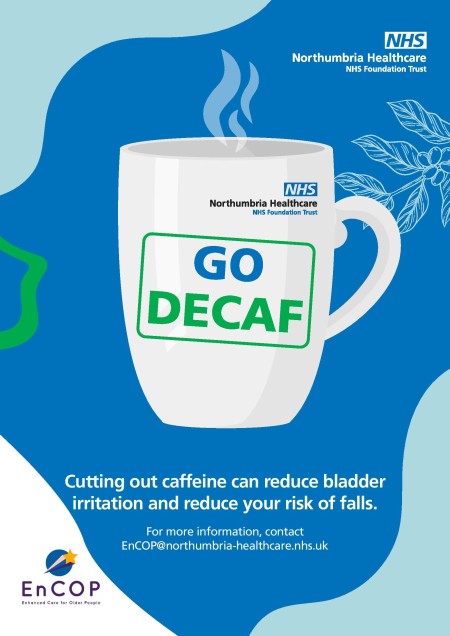Publish date: 30 July 2025
How going decaf could boost patient safety by reducing falls in hospitals

A pilot project has shown how a switch to decaffeinated drinks could help reduce falls on hospital wards in Northumberland and North Tyneside.
And the Go decaf project at Northumbria Healthcare NHS Foundation Trust has now been shortlisted for a Patient Experience Network National Award (PENNA) in the Measuring, Reporting & Acting – Using Insight for Improvement category.
Across the trust’s hospitals, decaf drinks are available but not routinely offered to patients during drinks rounds. A wide range of specialists agree that making decaf drinks the norm could bring a range of benefits.
Chief among these was the potential reduction in patients falling as they try to go to the toilet, with data showing that more than a quarter of slips, trips and falls were due to this, particularly at night.
Two trials have now taken place with the first, in May 2024, involving wards at the Northumbria Specialist Emergency Care Hospital in Cramlington, Wansbeck and Hexham General Hospitals, Blyth Community Hospital, plus a care home.
The second, from January to March this year, expanded into 5 more wards, including in our community hospitals at Alnwick and Berwick. This meant that all the trust’s Care of the Elderly wards were included.
Elaine Francis, lead educator for the Enhanced Care for Older People (EnCOP) programme, said: “We have to be slightly cautious because there are many uncontrolled variables and other factors, but the results were still very exciting.
“During the first trial, we saw an 11% fall in toileting falls, and this was even higher at 20% in the second trial. We saw a 50% or more drop in toileting falls on 3 wards in trial 1 and 7 wards in trial 2.”
The trials also revealed other benefits such as improvements to skin health, and three-quarters of ward managers reporting improvements such as calmer patients, better sleep, and reduced agitation. All managers said they want to continue with decaf based on their trial experience.
While there is a desire to roll this out further across the trust, the goal is ‘decaf by default’, which means patients will always have a choice to have a caffeinated drink.
As part of the trials, taste tests also took place, with more than half noticing a difference. However, 85% were willing to switch when they were told about the benefits, with staff supported by the EnCOP and continence team to talk to patients about caffeine and its effects.
Clare Collins, from EnCOP, said: “We aren’t the first to do something like this; we were inspired by colleagues at University Hospitals of Leicester NHS Trust.
“Nonetheless, it has still sparked a lot of interest with more than 15 other NHS trusts contacting us to find out more, and thousands of people reading our blogs online.”
Go decaf is not the only Northumbria Healthcare project in the running for a PENNA award this year.
Innovating the traditional lung cancer patient pathway, focusing on the trust’s national-first lung oncology Hospital at Home (virtual) ward, is shortlisted in both the Cancer Experience of Care and Personalisation of Care categories.
Media contact
Ben O'Connell, external communications manager
ben.
